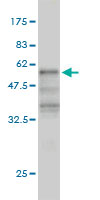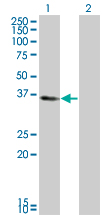KLF6 Antibody (monoclonal) (M01)
Mouse monoclonal antibody raised against a full length recombinant KLF6.
- 产品详情
- 实验流程
- 背景知识
Application
| WB |
|---|---|
| Primary Accession | Q99612 |
| Other Accession | BC004301.1 |
| Reactivity | Human |
| Host | mouse |
| Clonality | monoclonal |
| Isotype | IgG1 kappa |
| Clone Names | 1A9 |
| Calculated MW | 31865 Da |
| Gene ID | 1316 |
|---|---|
| Other Names | Krueppel-like factor 6, B-cell-derived protein 1, Core promoter element-binding protein, GC-rich sites-binding factor GBF, Proto-oncogene BCD1, Suppressor of tumorigenicity 12 protein, Transcription factor Zf9, KLF6, BCD1, COPEB, CPBP, ST12 |
| Target/Specificity | KLF6 (AAH04301.1, 1 a.a. ~ 260 a.a) full-length recombinant protein with GST tag. MW of the GST tag alone is 26 KDa. |
| Dilution | WB~~1:500~1000 |
| Format | Clear, colorless solution in phosphate buffered saline, pH 7.2 . |
| Storage | Store at -20°C or lower. Aliquot to avoid repeated freezing and thawing. |
| Precautions | KLF6 Antibody (monoclonal) (M01) is for research use only and not for use in diagnostic or therapeutic procedures. |
For Research Use Only. Not For Use In Diagnostic Procedures.
Provided below are standard protocols that you may find useful for product applications.
BACKGROUND
This gene encodes a nuclear protein that has three zinc fingers at the end of its C-terminal domain, a serine/threonine-rich central region, and an acidic domain lying within the N-terminal region. The zinc fingers of this protein are responsible for the specific DNA binding with the guanine-rich core promoter elements. The central region might be involved in activation or posttranslational regulatory pathways, and the acidic N-terminal domain might play an important role in the process of transcriptional activation. It is capable of activating transcription approximately 4-fold either on homologous or heterologous promoters. The DNA binding and transcriptional activity of this protein, in conjunction with its expression pattern, suggests that this protein may participate in the regulation and/or maintenance of the basal expression of pregnancy-specific glycoprotein genes and possibly other TATA box-less genes. Two transcript variants encoding the same protein have been found for this gene. [provided by RefSeq]
REFERENCES
1.Caffeic Acid Phenethyl Ester Causes p21 Induction, Akt Signaling Reduction, and Growth Inhibition in PC-3 Human Prostate Cancer Cells.Lin HP, Jiang SS, Chuu CP.PLoS One. 2012;7(2):e31286. Epub 2012 Feb 7.
终于等到您。ABCEPTA(百远生物)抗体产品。
点击下方“我要评价 ”按钮提交您的反馈信息,您的反馈和评价是我们最宝贵的财富之一,
我们将在1-3个工作日内处理您的反馈信息。
如有疑问,联系:0512-88856768 tech-china@abcepta.com.























 癌症的基本特征包括细胞增殖、血管生成、迁移、凋亡逃避机制和细胞永生等。找到癌症发生过程中这些通路的关键标记物和对应的抗体用于检测至关重要。
癌症的基本特征包括细胞增殖、血管生成、迁移、凋亡逃避机制和细胞永生等。找到癌症发生过程中这些通路的关键标记物和对应的抗体用于检测至关重要。 为您推荐一个泛素化位点预测神器——泛素化分析工具,可以为您的蛋白的泛素化位点作出预测和评分。
为您推荐一个泛素化位点预测神器——泛素化分析工具,可以为您的蛋白的泛素化位点作出预测和评分。 细胞自噬受体图形绘图工具为你的蛋白的细胞受体结合位点作出预测和评分,识别结合到自噬通路中的蛋白是非常重要的,便于让我们理解自噬在正常生理、病理过程中的作用,如发育、细胞分化、神经退化性疾病、压力条件下、感染和癌症。
细胞自噬受体图形绘图工具为你的蛋白的细胞受体结合位点作出预测和评分,识别结合到自噬通路中的蛋白是非常重要的,便于让我们理解自噬在正常生理、病理过程中的作用,如发育、细胞分化、神经退化性疾病、压力条件下、感染和癌症。







